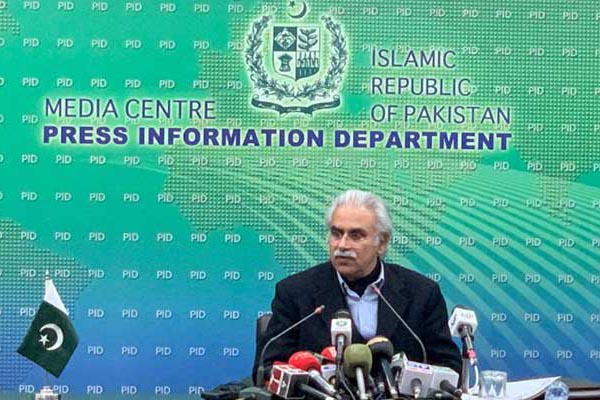
File photo. Courtesy PID
Special Assistant to the P.M. on Health rules out imposing WHO-recommended intermittent lockdowns
The Government of Pakistan is pursuing a “holistic” strategy to combat the coronavirus pandemic, Special Assistant to the P.M. on Health Dr. Zafar Mirza claimed on Wednesday, as calls to implement recommendations by the World Health Organization to curb its spread drew support on social media.
In a statement issued to media, the de facto health minister said that WHO was only worried about people’s health, while the government had to consider multiple factors in its decision-making.
Reiterating statements issued by Prime Minister Imran Khan, he said the government has taken the “best sovereign decisions in the interest of our people,” adding that he believed the virus could be curbed if people fully adopted guidelines provided by authorities to stem the spread of COVID-19.
WHO, on Tuesday, wrote letters to senior health officials across Pakistan pointing out that the country had eased lockdowns before meeting a single prerequisite needed to take such a decision. It said that in the face of a dramatic spike in cases, the country needed to impose intermittent lockdowns to ensure the health infrastructure did not get overburdened.
The global health body’s recommendations echo recommendations by healthcare workers—barring government mouthpieces Dr. Yasmin Rashid, Dr. Mirza and Dr. Faisal Sultan—who have all warned that the country cannot afford to continue easing restrictions as medical facilities in major cities are already at capacity. The prime minister has continuously slammed these calls, claiming it would only benefit the “elite”—a socioeconomic class he is very much a part of.
Ruling out imposing any further lockdowns, Dr. Mirza claimed Pakistan had gradually eased generalized lockdowns while focusing on the enforcement of SOPs in shops, industries, mosques and public transport. This is not entirely true, as stated by WHO, which noted the country essentially lifted all but a few restrictions en masse ahead of Eidul Fitr in May.
According to Mirza, the government has in recent days made wearing face masks mandatory, and has also developed a robust tracing, testing and quarantine policy to identify hotspots and cordon them off. He claimed more than 700 “smart lockdowns” were in place nationwide as part of this policy. However, again, this is not entirely true, as a report compiled by the Punjab Health Department had noted the rate of transmission was nearly uniform across all districts of provincial capital Lahore, but it continues to experience the least amount of restrictions.
The special assistant to the P.M. said the government was also focusing on ramping up its healthcare system to cater to the growing number of patients, claiming that policies enacted had been taken in light of evidence on the spread of the disease. He said Pakistan appreciates its longstanding partnership with WHO in matters related to health, including during the pandemic.
